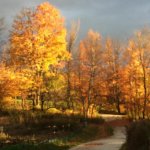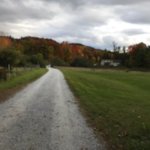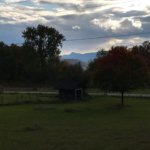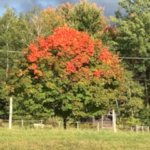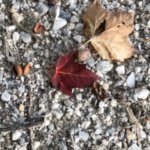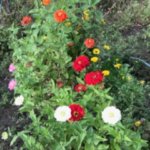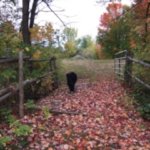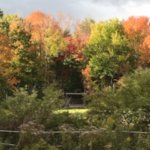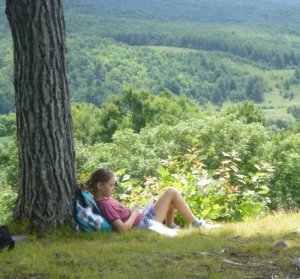Sing:
Hark the Vesper bell is pealing,
O’er the meadow soft and green.
Nearer now and nearer stealing,
Soft it breaks upon my ear.
Jubilate, jubilate, jubilate, Amen. Jubilate, jubilate, jubilate, Amen.
First Words:
In a usual summer, camp’s silence following on three months of high activity and fun feels strangely quiet, oddly meditative. In this highly unusual summer, silence was available some of each and every day. Those of us working around camp came to love the silence even as we missed each and every person not here. The silence had a richness to it—the morning bird songs became so familiar we could almost whistle the sounds. We noticed the wind and the absence of it on still days. We appreciated the gifts of the garden more than ever as it handed us beautiful flowers, plentiful food and serenity.
September arrived with stunning sunsets, five frosty mornings followed, the summer birds, including the loon who enjoyed the pond all summer long, took off for points to the south. The murder of crows have become our closest and noisiest neighbors.
And now it is the end of September, and at camp, in our towns and cities, on mountain tops and by stream beds, if we think back over the weeks of this month, we acknowledge that concerns of too many sorts have touched our sense of the fall. In the American West forest fires burn and burn and burn. Across the country political parties spar and confuse us. And continuing, there is the virus forcing us to continue to attend to its risks. One can get pretty discouraged, a sentiment more usually unknown to most of us in one of the most beautiful of months.
This particular September, and the months that continue to unfold will best be lived with the faith that “All shall be well again, we know.” We can be grateful for this well-loved camp song.
Sing: “Julian of Norwich”
Loud are the bells of Norwich
And the people come and go.
Here by the tower of Julian,
I tell them what I know.
Chorus:
Ring out bells of Norwich and let the winter come and go.
All shall we well again, I know.
Love, like the yellow daffodil is coming through the snow.
Love, like the yellow daffodil is lord of all I know.
Chorus
Ring for the yellow daffodil the flower in the snow.
Ring for the yellow daffodil and tell them what I know.
Chorus
All shall be well, I’m telling you,
Let the winter come and go.
All shall be well again, I know.
A few more words:
“Faith” is a word perhaps most frequently used in a religious sense. Could that be because embedded in the idea of “faith” is a sense of the unknown? None of us really know how the challenges we face each and every day will come out. But we go forward into the day because we have a sense that things will work out. Faith, then, is a very important sense that we all should nurture!
A Mary Oliver poem of course! (Little summer poem touching the subject of Faith )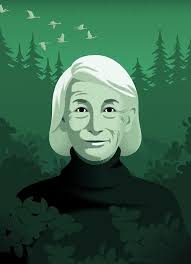
Every summer
I listen and look
under the sun’s brass and even
into the moonlight but I can’t
hear
anything I can’t see anything—
not the pale roots digging down
nor the green stalks muscling up,
nor the leaves
deepening their damp pleats,
nor the tassels making,
nor the shucks, nor the cobs.
And still,
every day,
the leafy fields
grow taller and thicker—
green gowns lofting up in the
night, showered with silk.
And so, every summer,
I fail as a witness, seeing nothing-
I am deaf too
to the tick of the leaves,
the tapping of downwardness
from the banyan feet—
all of it
happening
beyond any seeable proof, or
hearable hum.
And, therefore, let the
immeasurable come.
Let the unknowable touch the
buckle of my spine.
Let the wind turn in the trees,
and the mystery hidden in the dirt
swing through the air.
How could I look at anything in
this world
and tremble, and grip my hands
over my heart?
What should I fear?
One morning
in the leafy green ocean
the honeycomb of the corn’s
beautiful body
is sure to be there.
Sing: “Give yourself to Love”, by Kate Wolf
Kind friends all gather ‘round, there’s something I would say.
What brings us together here has blessed us all today.
Love has made a circle that holds us all inside.
Where strangers are as family, and loneliness can’t hide.
Chorus:
So give yourself to love.
If love is what you’re after.
Open up your heart to….tears and laughter.
Yes and give yourself to love, give yourself to love.
We’ve walked these mountains in the rain.
We’ve learned to love the wind.
We’ve been up before the sunrise to watch the day begin.
I always knew I’d find you, but I never did know how.
But like sunshine on a cloudy day, you stand before me now.
Chorus
Love is born in fire, it’s planted like a seed.
Love can’t give you everything, but it gives you what you need.
Love comes when you’re ready, love comes when you’re afraid
It will be your greatest teacher, the best friend you have made.
Chorus
Quotes about Faith
“All the world is made of faith, and trust, and pixie dust.” -J.M. Barrie in Peter Pan
“A wise woman knows when to stay silent. However, a wiser woman of faith knows that sometimes words can win the battle, when all odds stand against her.” -Shannon L. Alder
“Faithless is he that says farewell when the road darkens.” -J.R.R. Tolkien in The Fellowship of The Ring
“A woman of faith does not allow problems to overwhelm her. She uses her faith to find solutions.” -Gift Gugu Mona
“You must not lose faith in humanity. Humanity is like an ocean; if a few drops of the ocean are dirty, the ocean does not become dirty. -Mahatma Gandhi
“Do not think that love in order to be genuine has to be extraordinary. What we need is to love without getting tired. Be faithful in small things because it is in them that your strength lies. -Mother Teresa
Sing: “Peace I ask of thee o Mountains” , a camp song
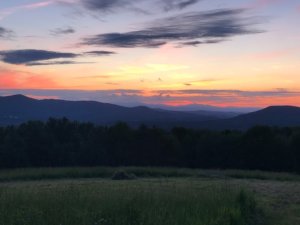
Peace I ask of thee, oh mountains.
Peace, peace, peace.
When I learn to live serenely,
Cares will cease.
From the hills I gather courage.
Visions of the days to be.
Strength to lead and faith to follow,
All are given onto me.
Peace I ask of thee, oh mountains.
Peace, peace, peace.
Some thoughts and a story:
In thinking about how to nurture faith we can all agree that it is easier to be faith-full is we find the courage, the strength and the hope to work towards the better world we all wish for. Together with others raising their voices, we can take a stand, we can take action, and most importantly, we can see the results of so doing.
One of September’s difficult moments was the passing of Judge Ruth Bader Ginsburg. She was a person whose life reflected never-ending faith both that change can happen AND that she could help it along!
Author Debbie Levy wrote a book about RBG’s life called I DISSENT: RUTH BADER GINSBURG MAKES HER MARK. Here are excerpts from the author’s biography of this important change- maker, one we will all miss.
You could say that Ruth Bader Ginsburg’s life has been….one disagreement after another. This is how Ruth Bader Ginsburg changed her life—and ours.”
In 1940, little Ruth’s neighborhood was vibrant with immigrants—people from Italy, Ireland, England, Poland, and Germany. Jews from Russia, like Ruth’s father, Nathan Bader. People from different cultures with different holidays, foods, and traditions.
But in all these families in Brooklyn, New York, and in families everywhere, one thing was the same: Boys were expected to grow up, go out in the world, and do big things. Girls? Girls were expected to find husbands.
Ruth’s mother disagreed.
Celia Amster Bader thought girls should also have the chance to make their mark on the world. So she took Ruth to the library.
On the shelves were stories of girls and women who did big things. Ruth read about Nancy Drew, girl detective. She discovered Amelia Earhart, daring aviator. She learned of Athena, goddess of Greek myths. Here were independent girls and women, taking charge.
Ruth read her way into this world. Around her, the sweet scent of books blended with savory aromas from the Chinese restaurant downstairs. Delicious! A girl could be anything.
Sometimes Ruth and her parents took car trips out of the crowded city. As they drove past a hotel in Pennsylvania, Ruth saw a sign: NO DOGS OR JEWS ALLOWED! This is how it was in those days: hotels, restaurants, even entire neighborhoods announcing NO JEWS, NO COLORED, NO MEXICANS, WHITES ONLY. Ruth and her family were Jewish. This was prejudice, pure and simple. Now it was Ruth’s turn to disagree. She disagreed by never forgetting how it felt to read such words. She never forgot the sting of prejudice…….
Not many girls went to college in the 1950s. Ruth made friends, but she also met girls who excluded Jews from their clubs. She met boys who thought girls should be looking for husbands. And then she met Martin Binsburg.
Marty was tall and funny. Ruth was small and serious. Marty could make her laugh. They fell in love and hatched a plan: After college, they would go to law school—both of them. Lawyers, Ruth had learned, could fight unfairness and prejudice in courts.
People thought it was a fine idea for Marty to attend law school. They didn’t think Ruth should go. A lady lawyer? People disapproved. Ruth disapproved right back. So did Marty.
They got married. They went to law school. And they had a baby—Jane.
Ruth’s law school had a total of nine women—and 500 men. She studied mightily and tied for first place in the class. And yet at graduation time no one would hire this brilliant new lawyer.
Why not? She was a woman. Men didn’t want to work with a woman. She was a mother. Men thought a mother wouldn’t pay attention to work. She was Jewish. Many people were still prejudiced. Three strikes against her. But Ruth was not out. She resisted and persisted.
Finally a judge hired her, and she worked like mad for him. After that, one law school hired her, and then another. Ruth became one of the few female law professors in the whole country. And she did it with a new baby at home—James……
Ruth (eventually) went to court to fight for equal treatment of women. The most important cases went to the Supreme Court. The first time she appeared there, Ruth was so nervous she feared she might be sick. But standing before the nine Supreme Court justices, Ruth imagined them as her students. She, Professor Ginsburg, need to teach these students—who were all men—why a person’s choices shouldn’t be limited just because she was born a girl.
Ruth wasn’t only fighting for women. When women were excluded from the work world, men were excluded from home life. Why shouldn’t a father stay home to care for his children and cook the meals? Why shouldn’t his wife run a business? These were fresh ideas in the 1970s.
Ruth did not win every case, but she won enough. With each victory, women and men and girls and boys enjoyed a little more equality.
Sometimes Ruth and Marty’s children received confused looks when they said that their mother argued cases in the Supreme Court and their father made the family’s dinners. People found this strange. Ruth, Marty, Jane and James did not concur.
They kept on being the type of family they wanted to be. And dinners at the Ginsburg home were delicious! Marty was a successful lawyer, but also a marvelous chef who had mastered the art of French cooking. Ruth, her family knew, had mastered the art of burnt pot roast.
Ruth became well known as a lawyer—so well known that President Jimmy Carter chose her to be a judge in Washington, D.C. Then Ruth became known as a first-rate judge—and President Bill Clinton asked her to be a justice on the Supreme Court. … RUTH AGREED. In 1993 Justice Ruth Bader Ginsburg became the first Jewish woman on the nation’s highest court……
Many have cheered Justice Ginsburg for her persistence and independence. They’ve called her a rock star, a queen, a goddess—a hero! Of course, Ruth Bader Ginsburg isn’t a rock star, a queen, or a goddess. But to many, she is a hero. She made change happen, and she changed minds. She cleared a path for people to follow in her footsteps—girls in college, women in law school, and everyone who wants to be treated without prejudice. Her voice may not carry a tune, but it sings out for equality.
Step by step, she has made a difference…..one disagreement after another.
Sing: ” Step by Step”, by Waldemar Hille and Pete Seeger. We have sung this song at camp, but not frequently. Next year we will all learn it! Sing out if you already have!
Step by step, the longest march can be won, can be won.
Many stones can form an arch, singly none, singly none.
And in union what we will, can be accomplished still.
Drops of water turn a mill, singly none, singly none.
A few more words:
These times require that each of us, with the support of the many others who are finding strength together, find faith to work towards change. Already many of us are doing just that and are continuing to watch for opportunities to turn faith into action. It feels good to do so!
In the interests of our camp taking clear steps towards change, a group of long-time camp community members, Nina Alvarado Silverman, Christie Belanger, Devri and Lorrie Byrom and Isabel Darby worked on a camp statement that will be posted on our website and that will be a continuing guidepost for camp commitments and action. Here is our statement:
Camp Betsey Cox has always fostered a special kind of community. Our community is committed to nurturing and growing strong, smart, independent young people who will go on to make a positive difference in the world. We hold that equality, justice and respect are imperatives. Camp Betsey Cox community members are willing to engage in challenging conversations about things that matter, always with civility, compassion and respect.
All moments of injustice demand action and our institutional and personal responses reflect the integrity of our community. We believe that Black Lives Matter. We stand with Black members of the camp community and their families. We condemn police brutality and white supremacy which continue to negatively impact us all and our country to this day.
We believe in facts, in science, in democracy, civil discourse and in the importance of playing a positive role in the world. We pledge to do our part in making a better world for all.
Sing” “ I would be True”, A very old camp song written by Howard Walter
I would be true, for there are those who trust me.
I would be pure, for there are those who care.
I would be strong, for there is much to suffer;
I would be brave, for there is much to dare.
I would be brave, for there is much to dare.
I would be friend of all—the foe the friendless;
I would be giving, and forget the gift;
I would be humble, for I know my weakness;
I would look up, and laugh, and love, and lift.
I would look up, and laugh and love and lift.
Final Word:
“Faith is to believe what you do not see; the reward of this faith is to see what you believe.”
-Saint Augustine
A Moment of Silence
Jubilate, Jubilate, Jubilate, Amen. Jubilate, jubilate, jubilate, Amen.

